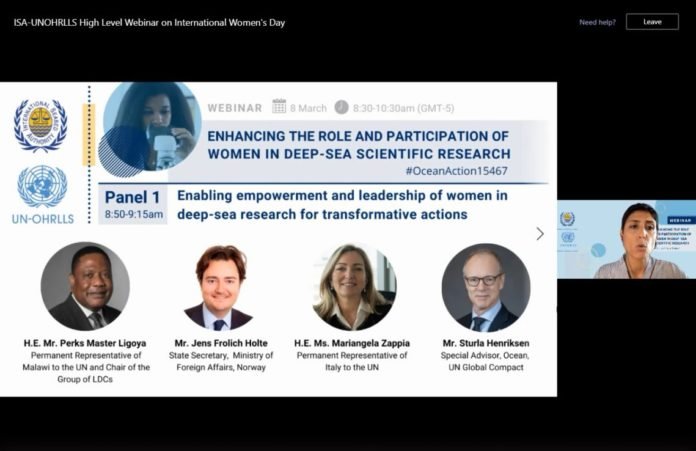NEW YORK, MARCH 8 – Balanced gender representation is a challenge in science and research, not just in public life: according to UNESCO, just 30% of the world’s researchers are women, and, while a growing number of women are enrolling in university, many opt out at the highest levels required for a research career. Addressing a UN panel on ‘Enabling empowerment and leadership of women in deep-sea research for transformative actions’, the Italian Permanent Representative to the UN, Mariangela Zappia, noted that progress to improve the representation of girls and women in science, technology, engineering, mathematics, and medical fields (STEMM) “has been too slow, progress has plateaued, or even moved backward in some cases”.
Ocean science is no exception: “Women are under-represented especially in highly technical sectors such as deep-sea research, and in leadership positions. Numbers are low everywhere but in particular in LDCs, SIDS and land-locked developing countries”, Zappia said on International Women’s Day. At the same time, there is now an opportunity for a “reset” as the Secretary-General Antonio Guterres has emphasized on several occasions: “Facts show that, whenever women are given the opportunities to fully and meaningfully participate in public life, they can make the difference. Throughout last year, women and girls in science have been on the forefront of the response to the COVID crisis. They have been healthcare workers and innovators. They have been researching vaccines and pioneering treatments. They have been leading us toward a safer world”.
The core issue to tackle, according to Zappia, is access to power and distribution of power, and the UN has a role to play in making this happen. A few suggestions in this regard include mainstreaming gender into international governance for the oceans and their science, and making the participation of women in ocean science must a priority for all Member states.
Italy attaches the greatest importance to the synergic achievement of SDG5 and SDG14, added Zappia: “We have almost filled the gender gap in marine sciences and nowadays women equal men in marine research institutions and universities”. In Italy, a woman, Professor Nadia Pinardi from the University of Bologna, kick-started over twenty years ago the Italian operational oceanography when she created the first ocean numerical model in Europe and the second in the world.(@OnuItalia)

